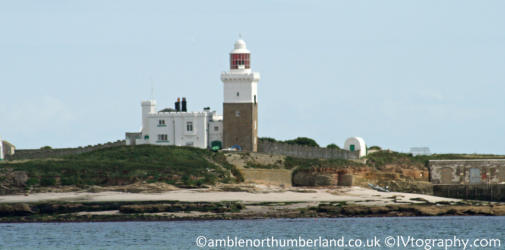amble & northumberland
We are proud to be
Gold Award
Northumberland Tourism Ambassadors!

COQUET ISLAND
Coquet Island is a small island of about 6 hectares (fifteen acres), situated 1.2 km
off Amble on the Northumberland coast. The Island is owned by the Duke of
Northumberland; however the RSPB (Royal Society for the Protection of Birds)
manage the island as a bird reserve, for its important seabird colonies.
The most numerous species is the Puffin, with over 18,000 pairs nesting in 2002,
but the island is most important for the largest colony of the endangered Roseate
Tern in Britain – about 90%, which, thanks to conservation measures including the
provision of nestboxes to protect the nests from gulls and bad weather, has risen
to 92 pairs in 2005. Other nesting birds include Sandwich Tern, Common Tern,
Arctic Tern, Black-legged Kittiwake, Fulmar, three gull species, and Eider Duck. It is
also possible to view seals on and around the island.
Like many places in Northumberland, Coquet Island is a key historical site and has been occupied since the 7th
Century. The main building on the island is the remaining structure of a medieval monastery, which was largely
incorporated into the 19th-century lighthouse and lighthouse keepers' cottages.
The actual island is a small low tract of green pastureland lying close inshore off the coast. Trinity House built a
very substantial lighthouse in 1841 on the south western shore at a cost of £3,268.
The lighthouse was built to the design of James Walker, the white square tower is of sandstone surrounded by a
turreted parapet with walls in excess of one metre thick. The dwelling houses are still an integral part of the
fortress-like structure where the keepers appointed to attend the light lived during their periods on duty. The
first keeper appointed to Coquet lighthouse was William Darling, elder brother of Grace Darling. He was in fact
the second of her brothers to become a keeper in the Trinity House Service. It has been said that it was probably
a boat trip to see her brother at Coquet Island in the summer of 1842 that led to a chill which eventually proved
fatal to Grace Darling as she died from tuberculosis ("consumption")
During the spring and summer RSPB wardens live on the island to protect the nesting birds. The lighthouse is
operated by Trinity House and is now automatic with no resident keeper, so the island is uninhabited in winter.
Birds are everywhere on Coquet and the walls and gardens are home to several hundred nesting eider ducks.
For this reason, the island is designated as a sanctuary and the public are not allowed to land. However, it is still
possible to view Puffins, Roseates and the other Terns and seabirds by taking a Puffin Cruise around the island.










































